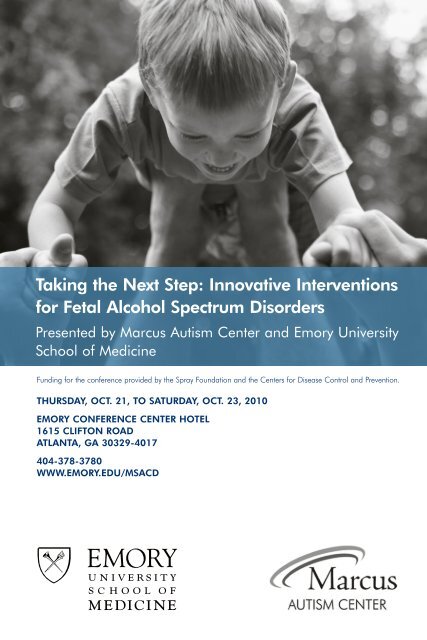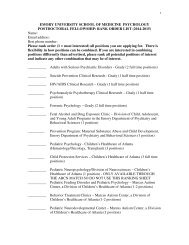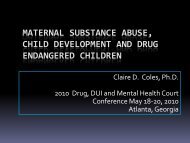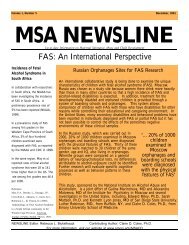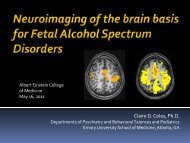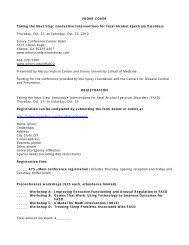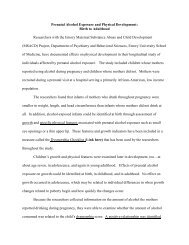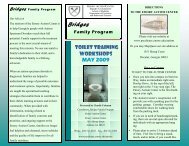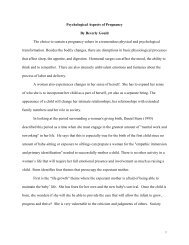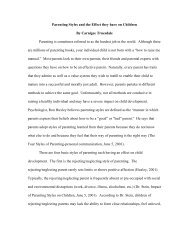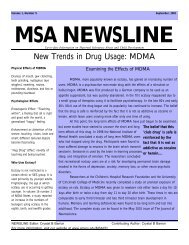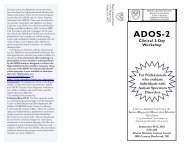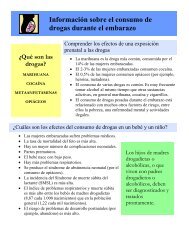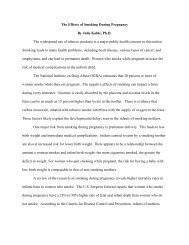Conference Brochure (PDF) - Emory Psychiatry - Emory University
Conference Brochure (PDF) - Emory Psychiatry - Emory University
Conference Brochure (PDF) - Emory Psychiatry - Emory University
You also want an ePaper? Increase the reach of your titles
YUMPU automatically turns print PDFs into web optimized ePapers that Google loves.
Taking the Next Step: Innovative Interventions<br />
for Fetal Alcohol Spectrum Disorders<br />
Presented by Marcus Autism Center and <strong>Emory</strong> <strong>University</strong><br />
School of Medicine<br />
Funding for the conference provided by the Spray Foundation and the Centers for Disease Control and Prevention.<br />
Thursday, Oct. 21, to Saturday, Oct. 23, 2010<br />
<strong>Emory</strong> <strong>Conference</strong> Center Hotel<br />
1615 Clifton Road<br />
Atlanta, GA 30329-4017<br />
404-378-3780<br />
www.emory.edu/MSACD
Registration<br />
Taking the Next Step: Innovative Interventions<br />
for Fetal Alcohol Spectrum Disorders (FASD)<br />
Thursday, Oct. 21, to Saturday, Oct. 23<br />
Registration can be completed by submitting the form below or online at:<br />
http://www.regonline.com/fasdfallconference<br />
Name (print)<br />
Credentials<br />
Address<br />
City State ZIP<br />
E-mail address<br />
Business phone<br />
Other phone<br />
<strong>University</strong>/agency affiliation<br />
Special needs (including diet restrictions)<br />
Registration Fee:<br />
$75—Main conference registration<br />
(includes Thursday opening reception and Friday and Saturday buffet lunch)<br />
Preconference workshops ($25 each, attendance limited)<br />
Workshop A: Improving Executive Functioning and Arousal Regulation in FASD<br />
Workshop B: Games That Work: Using Technology to Improve Outcomes for FASD<br />
Workshop C: A Model for Math Intervention: Math Interactive Learning Experience (MILE)<br />
Workshop D: Treating Sleep Problems Associated With FASD<br />
Total amount enclosed: _______<br />
Type of payment<br />
Credit Card (circle one) Visa MasterCard American Express Discover<br />
Card number<br />
Expiration date (required)<br />
Printed name (as it appears on card)<br />
Cardholder’s signature<br />
Check (payable to Stellar Meetings and Incentives)<br />
Children’s Healthcare of Atlanta departmental account<br />
Supervisor’s signature Dept. # Account # Supervisor’s phone #<br />
Complete and return form with payment to:<br />
Colleen McGhee, Stellar Meetings and Incentives, 1270 Caroline St., Suite D120-232 Atlanta, GA 30307-2758.<br />
Fax: 404-378-1587<br />
Contact Colleen McGhee at 404-378-3780 or colleen@stellar-inc.com for registration information.<br />
Refund Policy: If you need to cancel your registration, notify us at least seven days before the course and we will issue a refund<br />
(minus a $25 administrative fee). No-shows or cancellations received fewer than seven days prior to the course are ineligible for a refund.
Agenda<br />
Thursday, Oct. 21<br />
1:30 p.m. Workshop A: Improving Executive Functioning and Arousal Regulation<br />
in FASD<br />
Julie Kable, Ph.D.<br />
3:15 p.m. Break<br />
Workshop B: Games That Work: Using Technology to Improve<br />
Outcomes for FASD<br />
Kimberly Kerns, Ph.D.<br />
Claire D. Coles, Ph.D.<br />
3:30 p.m. Workshop C: A Model for Math Intervention: Math Interactive<br />
Learning Experience (MILE)<br />
Elles Taddeo, Ed.D.<br />
Workshop D: Treating Sleep Problems Associated With FASD<br />
Katrina C. Johnson, Ph.D.<br />
5:15 p.m. Workshops adjourn<br />
6 p.m. Opening reception and poster presentations<br />
Friday, Oct. 22<br />
8 a.m. Be the Solution<br />
The <strong>Conference</strong> Format: What we can Learn From<br />
Others’ Experience<br />
Claire D. Coles, Ph.D.<br />
8:30 a.m. Developing Treatment Programs for Autism Spectrum Disorders (ASD)<br />
Gary Mesibov, Ph.D.<br />
11 a.m. Break<br />
Education and Behavior in FASD (panel discussion)<br />
Julie Kable, Ph.D.<br />
11:30 a.m. Early Intervention Programs to Promote Self-regulation<br />
Clancy Blair, Ph.D., M.P.H.<br />
1 p.m. Lunch<br />
New Approaches to Treating FASD in Young Children<br />
(panel discussion)<br />
Blair Paley, Ph.D.<br />
2 p.m. Review of Biological Interventions<br />
Jennifer Thomas, Ph.D.<br />
3:30 p.m. Break<br />
nutritional Interventions With Mother and Child (panel discussion)<br />
Christina Chambers, Ph.D., M.P.H.
Agenda<br />
4 p.m. Providing Clinical Services: Establishing Clinics and Programs for<br />
Diagnosis and Treatment of FASD (panel discussion)<br />
Sterling K. Clarren, M.D.<br />
6 p.m. Adjourn<br />
7 p.m. Leadership dinner (invitation only)<br />
Saturday, Oct. 23<br />
9 a.m. Interventions for Youth With ADHD: Making it Work in the Schools<br />
Steven W. Evans, Ph.D.<br />
10:30 a.m. Break<br />
Behavioral Interventions for FASD (panel discussion)<br />
Heather Carmichael Olson, Ph.D.<br />
11 a.m. Working with Adolescents and Young Adults With Disabilities<br />
(panel discussion)<br />
12:30 p.m. Lunch<br />
Growing into Young Adulthood with FASD: An Innovative and Intensive<br />
Treatment Model<br />
Leigh Tenkku, Ph.D., M.P.H.<br />
Project Step Up: A Program to Decrease Alcohol Use in Teens<br />
With FASD<br />
Mary J. O’Connor, Ph.D., A.B.P.P.<br />
Working with Affected Women<br />
Therese Grant, Ph.D.<br />
1:30 p.m. Invited Discussion by Leadership on Documenting <strong>Conference</strong> Ideas<br />
3:30 p.m. Adjourn<br />
Course Description<br />
Be the Solution<br />
The second Marcus Autism Center Leadership <strong>Conference</strong> is dedicated to increasing the availability of<br />
effective interventions for individuals with FASD. Attendees will gain greater understanding of currently<br />
available programs, share thoughts about effectiveness, find ways to overcome challenges and<br />
develop new ideas for future programs and methods.<br />
Researchers and practitioners at the forefront of FASD intervention efforts will lead the discussion<br />
and share their knowledge and insights. The conference is designed to provide information about<br />
successful, evidence-based interventions. Participants will have the opportunity to preview innovative<br />
programs currently in development. With the help of experts who have successfully developed<br />
programs for ASD, attention-deficit/hyperactivity disorder (ADHD) and early intervention, the<br />
discussion also will cover overcoming challenges to providing care. Topics include promoting<br />
arousal regulation and effortful control, treating underserved groups such as infants, adolescents<br />
and adults, and biological methods of treatment.
General Information<br />
Objectives<br />
Following the conference, participants should be better able to:<br />
– Meet and interact with leaders and interested professionals to develop mutual goals that better serve<br />
individuals and families affected by prenatal alcohol exposure.<br />
– Utilize new knowledge regarding existing, evidence-based intervention programs for individuals<br />
with FASD.<br />
– Understand and use specific techniques developed to improve outcomes in individuals with FASD.<br />
– Understand how work carried out with individuals with other disabilities may provide insight into new<br />
treatments for FASD.<br />
– Understand how prenatal alcohol exposure affects arousal regulation and effortful control.<br />
– Understand behavioral challenges experienced by youth with FASD.<br />
– Learn about potential biological interventions for prevention and treatment of FASD.<br />
– Understand the issues and challenges involved in providing intervention programs and services for<br />
infants and young children affected by alcohol.<br />
– Understand the issues and challenges involved in providing interventions and clinical services to<br />
underserved age groups including adolescents and adults.<br />
– Be familiar with different service models for establishing and maintaining clinics for diagnosis and<br />
treatment of FASD.<br />
Who Should Attend<br />
The conference is for physicians, psychologists, teachers, social workers, parents and foster parents<br />
interested in learning about the most recent intervention developments for individuals with FASD.<br />
Continuing Education Credits<br />
<strong>Conference</strong> sessions qualify for Area II or Area III continuing education credits for psychologists.<br />
Continuing education credits also have been applied for through the National Association of Social<br />
Workers, Georgia Chapter, and will be applied for through the State of Georgia Department of<br />
Education for teachers.<br />
Location/Accommodations<br />
<strong>Emory</strong> <strong>Conference</strong> Center Hotel<br />
1615 Clifton Road<br />
Atlanta, GA 30329-4017<br />
www.emoryconferencecenter.com<br />
<strong>Conference</strong> Coordinator<br />
Colleen McGhee<br />
Partner in Possibilities<br />
Stellar Meetings and Incentives<br />
colleen@stellar-inc.com<br />
404-378-3780<br />
Visit www.marcus.org or www.emory.edu/MSACD for more conference information.<br />
All programs are accessible to all persons. If you have a disability and require assistance to participate fully in conference activities, contact the<br />
conference coordinator to discuss your specific needs.
Faculty<br />
Faculty<br />
Clancy Blair, Ph.D., M.P.H.<br />
Applied Psychology<br />
Steinhardt School of Culture, Education and Human Development<br />
New York <strong>University</strong><br />
Claire D. Coles, Ph.D.<br />
<strong>Psychiatry</strong> and Behavioral Sciences<br />
<strong>Emory</strong> <strong>University</strong> School of Medicine<br />
FAS Clinic Director<br />
Marcus Autism Center<br />
Steven W. Evans, Ph.D.<br />
Psychology<br />
Co-Director, Center for Intervention Research in Schools<br />
Ohio <strong>University</strong><br />
Gary Mesibov, Ph.D.<br />
Psychology<br />
Fellow, Frank Porter Graham Child Development Institute<br />
<strong>University</strong> of North Carolina at Chapel Hill<br />
Jennifer Thomas, Ph.D.<br />
Psychology<br />
San Diego State <strong>University</strong>
Faculty<br />
Moderators/Workshop Presenters<br />
Christina Chambers, Ph.D., M.P.H.<br />
Associate Professor<br />
Pediatrics and Family and Preventive Medicine<br />
<strong>University</strong> of California, San Diego<br />
Program Director<br />
California Teratogen Information Service and<br />
Clinical Research Program<br />
Sterling K. Clarren, M.D.<br />
Clinical Professor of Pediatrics<br />
Division of Developmental Pediatrics<br />
<strong>University</strong> of British Columbia<br />
CEO and Scientific Director<br />
Canada Northwest FASD Research Network<br />
Co-Leader, FASD Project<br />
Neurodevelopmental Network Canada<br />
Clinical Professor of Pediatrics<br />
<strong>University</strong> of Washington<br />
Therese Grant, Ph.D.<br />
Ann Streissguth Endowed Professor in FASD<br />
Associate Professor of <strong>Psychiatry</strong><br />
and Behavioral Sciences<br />
Director, Fetal Alcohol and Drug Unit<br />
Director, Washington State Parent-Child<br />
Assistance Program<br />
<strong>University</strong> of Washington School of Medicine<br />
Katrina C. Johnson, Ph.D.<br />
Senior Research Associate<br />
Department of Psychology<br />
<strong>Emory</strong> <strong>University</strong><br />
Julie Kable, Ph.D.<br />
Assistant Professor, Department of Pediatrics<br />
<strong>Emory</strong> <strong>University</strong> School of Medicine<br />
FAS Clinic—Assistant Director<br />
Marcus Autism Center<br />
Kimberly Kerns, Ph.D.<br />
Associate Professor<br />
Department of Psychology<br />
<strong>University</strong> of Victoria<br />
Mary J. O’Connor, Ph.D., A.B.P.P.<br />
Adjunct Professor<br />
Program Director, UCLA FASD Clinic<br />
Program Director, UCLA ABC Child Day<br />
Treatment Program<br />
Training Director, Tarjan Center of Excellence<br />
in Developmental Disabilities<br />
Department of <strong>Psychiatry</strong> and<br />
Biobehavioral Sciences<br />
Neuropsychiatric Institute<br />
David Geffen School of Medicine<br />
<strong>University</strong> of California, Los Angeles<br />
Heather Carmichael Olson, Ph.D.<br />
Faculty, Department of <strong>Psychiatry</strong><br />
and Behavioral Sciences<br />
<strong>University</strong> of Washington School of Medicine<br />
Families Moving Forward Program<br />
Seattle Children’s Hospital Research Institute<br />
Staff Psychologist<br />
<strong>University</strong> of Washington Fetal Alcohol Syndrome<br />
Diagnostic and Prevention Network<br />
Director and Clinical Supervisor,<br />
Early Childhood Mental Health Clinic<br />
Child <strong>Psychiatry</strong> Outpatient Clinic,<br />
Seattle Children’s Hospital<br />
Blair Paley, Ph.D.<br />
Associate Clinical Professor<br />
Department of <strong>Psychiatry</strong> and<br />
Biobehavioral Sciences<br />
Semel Institute for Neuroscience and<br />
Human Behavior<br />
David Geffen School of Medicine<br />
<strong>University</strong> of California, Los Angeles<br />
Elles Taddeo, Ed.D.<br />
Education Specialist<br />
Department of <strong>Psychiatry</strong> and Behavioral Sciences<br />
<strong>Emory</strong> <strong>University</strong> School of Medicine<br />
Leigh Tenkku, Ph.D., M.P.H.<br />
Assistant Professor and Director for Research<br />
Department of Community and Family Medicine<br />
St. Louis <strong>University</strong> School of Medicine
Marcus Autism Center<br />
1920 Briarcliff Road<br />
Atlanta, GA 30329-4010<br />
©2010 Children’s Healthcare of Atlanta Inc. All rights reserved. MCS 939504.kc.7/10<br />
Pre-Sorted<br />
Standard<br />
U.S. Postage<br />
PAID<br />
Atlanta, GA<br />
Permit No. 2431


